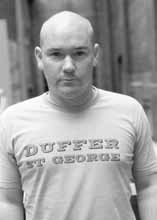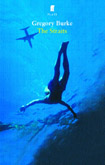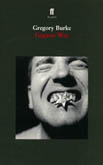Traverse Theatre
Gregory Burke Interview
 I once went to the Traverse with a ten-year-old who commented after the play, ‘it was very tight’. It turned out that he was referring to the seating arrangements, thigh to thigh, a Trav trademark brought over from the old High Street and Grassmarket days into the purpose-built Cambridge Street premises. When it burst onto the Traverse stage in the summer of 2001, Gagarin Way attracted plenty of comment about how tight it was – but here they definitely meant the script.
I once went to the Traverse with a ten-year-old who commented after the play, ‘it was very tight’. It turned out that he was referring to the seating arrangements, thigh to thigh, a Trav trademark brought over from the old High Street and Grassmarket days into the purpose-built Cambridge Street premises. When it burst onto the Traverse stage in the summer of 2001, Gagarin Way attracted plenty of comment about how tight it was – but here they definitely meant the script.
The Traverse is the only theatre in Scotland with the specific remit of nurturing new talent. It does this through diverse means – educational outreach, writing groups, workshops, and the Lizard, a monthly event at which professional actors read through selected short pieces and give valuable feedback to their authors. But of the thousands of unsolicited plays submitted annually, only one has made it onto the Traverse stage. Gagarin Way, by an ‘unknown’, was immediately perceived as excitingly original and hard-hitting, and the theatre engaged with the author, Gregory Burke, in developing his work. The final result was polished and poised, the script stiletto sharp.
The Traverse has now launched Burke’s second play for the stage, The Straits, an intense commentary on how nationalism is nurtured through the rituals of an introverted ex-pat community.
Burke was brought up in Fife, in a Forces family. He whizzed his way through everything in the local children’s library and when he was seven someone bent the rules and let him loose in the adult section. One book led to another. ‘It was a matter of connections,’ he says. ‘I’ve always been able to read very quickly. For as long as I can remember, I’ve had a book on the go.’
In that Fife library, Burke first encountered some of his great mentors – Harold Pinter, Samuel Beckett and Tennessee Williams. He calls Williams ‘a really political playwright’, but he’s not keen on Brecht or agit prop in general and is contemptuous of the lionisation of Alexander Trocchi.
As a youngster he was into sport as well as books and spent most Saturday afternoons chanting on the terraces. The passion for football provides a conventional vehicle of conversation for Scottish males, a theme that feeds his writing. Burke was a fan, an insider – but he was also an inveterate observer, clocking the opposing pulls of conformity and individuality. He wanted to write about men’s ‘infinite capacity for self-delusion’.
Gagarin Way takes its name from a street in Lumphinnans in Fife, a mining area and socialist heartland. Yuri Gagarin was the first man in space. To socialists around the world, the Russian astronaut’s helmeted visage floating the Sputnik womb symbolised the progressive genius of the USSR.
‘Economics decide the fate of people, not politicians,’ says Burke in the same ‘face-it, it’s part of life’ tone he uses on the subject of violence.
 When Gagarin Way was premiered, most of the press gave it an adulatory reception, though some dissenters argued that the pivotal character of Eddie was unbelievable. How could someone so intelligent and widely read descend into such savagery? they asked, with insouciant disregard of the undignified lessons of history. Gagarin Way is shocking, less because of the violence of the climax than because it nails some of the comforting, consensual lies we live by.
When Gagarin Way was premiered, most of the press gave it an adulatory reception, though some dissenters argued that the pivotal character of Eddie was unbelievable. How could someone so intelligent and widely read descend into such savagery? they asked, with insouciant disregard of the undignified lessons of history. Gagarin Way is shocking, less because of the violence of the climax than because it nails some of the comforting, consensual lies we live by.
The play is also very funny. ‘I didn’t expect it to be a comedy,’ Burke explains in his preface to the Faber playscript, ‘but when you consider the themes
… Marxist and Hegelian theories of history, anarchism, psychopathology, existentialism, mental illness, political terrorism, nihilism, globalisation and the crisis in masculinity – then it really couldn’t be anything else.’
When I met him, we wandered through Princes Street Gardens talking about politics and writing. He was clearly determined to counter the stereotyping drive of the media. Unlike Gagarin Way, The Straits is not in Scots, nor even set in Scotland. It is set in Gibraltar, where his father was posted in the 1970s and where he spent his teenage years.
Subversive yet affectionate, The Straits addresses ‘the politics of loyalism’ within Gibraltar’s ex-pat community at the time of the Falklands War.
‘Gibraltar went into overdrive during the Falklands War,’ says Burke. ‘Everyone supported Argentina. It was a really schizophrenic place.’ After the border with Spain closed, the community’s strengths and fault lines became even more pronounced. ‘There was a siege mentality. The British sort of coalesced, and there was a lot of feeling against the Spaniards. The British kids were calling the Spanish kids ‘spics’. A pack mentality took over.’
Burke’s chronic sense of dislocation comes out of those six years in Gibraltar and his cynicism about myths of national identity was reinforced on his return ‘home’ to Dunfermline, where he was slagged for being ‘English’. He took on the colouration of the local vernacular as a matter of survival.
 Octopuses change colour when they’re in danger. In Gibraltar, Burke and his mates would go spearing them to sell to local cafés. It was a solid little earner. Hunting octopuses was a way of proving manhood, and in a strange way it was also a declaration of ethnic superiority and territorial possession on the part of the ‘Forces brats’. This claustrophobic milieu, with its undertow of violence and realisation of identity through rejection of the other is viscerally evoked in The Straits. His characters know how to turn an octopus’s head inside out. As a playwright, Gregory Burke uses his critical and artistic insight to violate the stereotypes that conditioned him: he succeeds in turning the masculine psyche inside out.
Octopuses change colour when they’re in danger. In Gibraltar, Burke and his mates would go spearing them to sell to local cafés. It was a solid little earner. Hunting octopuses was a way of proving manhood, and in a strange way it was also a declaration of ethnic superiority and territorial possession on the part of the ‘Forces brats’. This claustrophobic milieu, with its undertow of violence and realisation of identity through rejection of the other is viscerally evoked in The Straits. His characters know how to turn an octopus’s head inside out. As a playwright, Gregory Burke uses his critical and artistic insight to violate the stereotypes that conditioned him: he succeeds in turning the masculine psyche inside out.
Copyright Jennie Renton 2005.

Comments